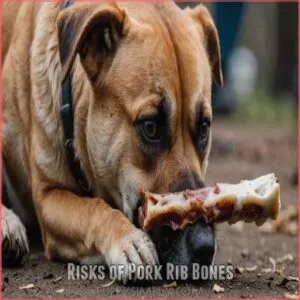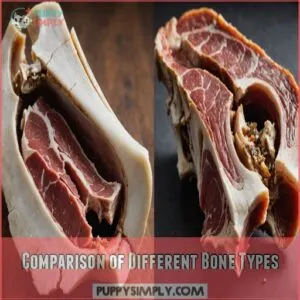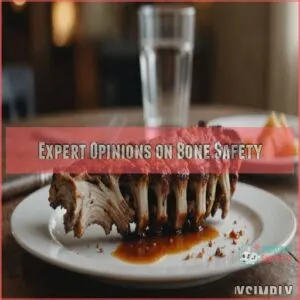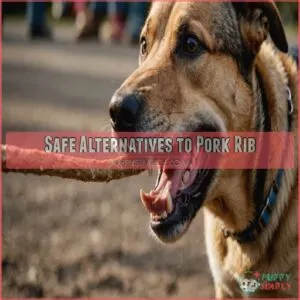This site is supported by our readers. We may earn a commission, at no cost to you, if you purchase through links.
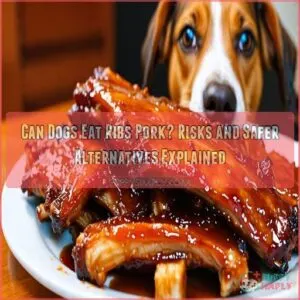 You might think treating your dog to ribs pork is a great idea, but hold your horses! Pork rib bones can splinter easily, leading to choking hazards or serious injuries like blockages in the gut or even punctures.
You might think treating your dog to ribs pork is a great idea, but hold your horses! Pork rib bones can splinter easily, leading to choking hazards or serious injuries like blockages in the gut or even punctures.
Plus, ribs cooked in rich sauces often contain garlic or onion, which are toxic to dogs.
Don’t let their sweet puppy eyes fool you—it’s not worth the risk.
Instead, opt for safer alternatives, like specially designed chew toys or bones approved by veterinarians.
Curious about these safer choices? Stick around as we reveal expert tips on keeping your pooch happy and healthy!
Table Of Contents
- Key Takeaways
- Risks of Pork Rib Bones
- Why Pork Rib Bones Are Dangerous
- Safe Alternatives to Pork Rib
- Frequently Asked Questions (FAQs)
- Can dogs eat cooked pork ribs?
- What do I do if my dog ate pork ribs?
- Is cooked pork ok for dogs?
- Can you eat pork rib bones?
- How do I safely dispose of pork bones?
- Can dogs have pork meat without bones?
- Are pork bones safe for puppies?
- What should I do if my dog ate a rib bone?
- Can cooked rib bones be softened for dogs?
- Conclusion
Key Takeaways
- Don’t give your dog pork rib bones as they can cause the same issues as cooked pork bones, a choking hazard, they can splinter and cause choking or internal injuries.
- Avoid ribs cooked in sauces since they might contain garlic or onion, which are toxic to dogs.
- Choose safer alternatives like bully sticks, durable antlers, or tough rubber toys to satisfy chew cravings.
- Watch for symptoms like vomiting or lethargy, as eating certain bones, such as cooked chicken bones, can pose serious health risks, if your dog eats ribs, and contact a vet immediately.
Risks of Pork Rib Bones
When you share pork rib bones with your dog, you risk serious health issues like choking, blockages, and splinter-related injuries.
These dangers can lead to emergencies that may require immediate veterinary care.
So it’s essential to understand the risks involved.
Choking Hazards and Blockages
Regarding rib bones, size and shape matter more than you think.
Cooked bones can splinter easily, making them a choking hazard.
Those bone fragments might block your dog’s intestines, leading to serious blockage symptoms.
If you see choking signs, seek emergency care immediately.
The risks aren’t worth it; always opt for safer alternatives.
Splintering and Injuries
Amidst a dinner with friends, it’s easy to slip rib bones to your dog without thinking.
Yet, cooked bones are notorious for splintering into sharp, dangerous fragments.
These can cause internal damage or punctures leading to internal bleeding, and even worse, a choking hazard.
Sharp bones often escalate to emergencies requiring vet care.
Keep rib bones off the menu.
Gastric Upset and Vomiting
Sharp shards from pork rib bones might cause gastric upset and vomiting in your dog.
If you’re looking for safer alternatives, consider products specifically designed for dogs that feature pork bones, like those found in pork bones for dogs.
It’s an unpleasant mess and more than just a cleaning job—it could point to something serious.
These fragments mess with their stomachs, becoming a
Pancreatitis and Dehydration
Seeing your furry friend vomit can be tough.
High-fat pork ribs can lead to pancreatitis, causing dehydration and serious health threats.
Watch for symptoms like vomiting, diarrhea, and lethargy.
Here’s what to do:
- Prevention: Avoid fatty foods in your dog’s diet.
- Treatment: Visit a vet if you suspect pancreatitis.
- Dog health risks: Keep those pork ribs off their menu.
Why Pork Rib Bones Are Dangerous
You might think a tasty pork rib bone is a treat for your furry friend, but think again!
Cooked pork rib bones easily splinter into sharp pieces that can cause serious internal injuries, blockages, and even death in dogs.
Raw Vs. Cooked Bone Debate
Pork rib bones harbor bacteria like salmonella, posing a risk of intestinal upset through raw pork rib ingestion. Pork rib bones present significant dog health risks.
Raw bones might seem natural, but bacterial concerns like salmonella lurk.
If you’re looking for safer options, consider dog-friendly chew alternatives.
Cooked bones become brittle, splintering into harmful shards that spell danger for your furry friend’s mouth and intestines.
Chewing strength varies, impacting digestion, and
Comparison of Different Bone Types
When considering safe bones for dogs, think about bone density and strength.
Chew size and texture matter too.
Pork rib bones are risky because they splinter easily, unlike denser beef bones.
Here’s a breakdown to guide you:
- Bone density varies greatly.
- Chew size impacts safety.
- Bone size should match your dog’s jaw.
- Strength determines breakage risk.
- Texture influences splintering potential.
Expert Opinions on Bone Safety
You might wonder, can dogs eat bones safely?
Experts advise against pork rib bones for your furry friend.
These bones easily splinter, posing raw bone risks and cooked bone dangers.
They can cause serious injuries or blockages.
Vet recommendations highlight dog breed considerations since what works for one mightn’t suit another.
Always prioritize dog bone safety and choose safe bones for dogs.
Safe Alternatives to Pork Rib
Keeping your dog safe while chewing can feel like walking a tightrope, but knowing safe alternatives to pork ribs makes it easier. Consider these options instead:
- Bully Sticks: These natural chews are easy to digest and less likely to cause hazards. Bully stick benefits include cleaning teeth and satisfying chewy urges. While cooked pork ribs can pose choking hazards, learn more about the risks of cooked pork ribs, these alternatives provide a safer option.
- Antlers: Durable and long-lasting, they’re excellent for strong chewers. Antler alternatives offer essential minerals but remember to monitor your pup to avoid chipped teeth.
- Tough Rubber Toys: Sturdy and entertaining, these toys encourage safe fun. Choose one larger than your dog’s bite to prevent swallowing fragments.
- Homemade Chews and Bone-Free Treats: Whip up safe, delicious snacks at home, making sure no hard edges or splinters risk your dog’s health.
Choose wisely and make sure your pet’s chewing keeps them happy and healthy.
Frequently Asked Questions (FAQs)
Can dogs eat cooked pork ribs?
No, cooked pork ribs are dangerous for dogs. They splinter easily, causing internal injuries. High fat content can lead to pancreatitis. Choose safer chews; your dog’s health is paramount.
What do I do if my dog ate pork ribs?
If your dog gobbled pork ribs, act quickly.
Check for choking, then call the vet.
Sharpened bone fragments can injure or block intestines, leading to emergency care.
Be vigilant for symptoms like vomiting, lethargy, or straining.
Is cooked pork ok for dogs?
Picture a cozy meal shared with your pup, but hold the pork ribs.
While cooked pork meat is generally safe in small amounts, avoid seasoning and bones.
Always make sure it’s plain, fully cooked, and served without any bones.
Can you eat pork rib bones?
You shouldn’t eat pork rib bones because they can cause digestive issues or lead to problems like choking hazards. They can splinter into sharp pieces.
These shards can cause severe injuries, like cuts in your mouth or throat, and might lead to internal damage, choking, or blockages.
Stay safe.
How do I safely dispose of pork bones?
Think of pork bones like trusted keepsakes better stored away than on display.
Wrap them tightly in a sealed bag to keep any tempting leftovers from curious pets.
Toss the bundle in the trash, away from reach.
Can dogs have pork meat without bones?
Certainly, dogs can safely eat pork meat without bones, as it’s a nutritious protein source, but be cautious of cooked pork chop bones [which can be hazardous to dogs](https://puppysimply.com/can-dogs-eat-cooked pork chop bones](https://puppysimply.com/can-dogs-eat-cooked-pork-chop-bones/) as they can cause choking, blockages, or damage to a dog’s digestive.
Just avoid seasoning or spices.
Cook the meat thoroughly to eliminate harmful bacteria, ensuring you keep their diet balanced and healthy.
Are pork bones safe for puppies?
Picture a toddler with sharp scissors, and you’ll get why pork bones aren’t safe for puppies.
Their delicate jaws can’t handle the risk of splintering and choking or the chance of causing serious internal injury.
Stick to safe chews.
What should I do if my dog ate a rib bone?
If your dog ate a rib bone, monitor them closely for vomiting or diarrhea.
Cooked bones, especially those that can cause internal bleeding like cooked lamb bones splinters, are especially dangerous; call your vet immediately if you see any problems.
Prevention’s key; avoid giving bones in the future.
Can cooked rib bones be softened for dogs?
Cooked rib bones can’t be softened safely for dogs.
They tend to splinter, which is risky.
Splintered bones can cause choking, puncture internal organs, or block intestines.
Stick to safe chew options like antlers or rubber toys.
Conclusion
Much like the Trojan horse, feeding ribs pork to your dog might seem harmless but can bring hidden dangers.
The risks are high with choking from splintered bones, digestive blockages, and exposure to harmful ingredients.
Protect your furry friend by opting for vet-approved chew toys and bones.
Always prioritize your dog’s health over tempting treats.
By choosing safer alternatives, you guarantee many happy and safe tail-wagging moments with your pet.

